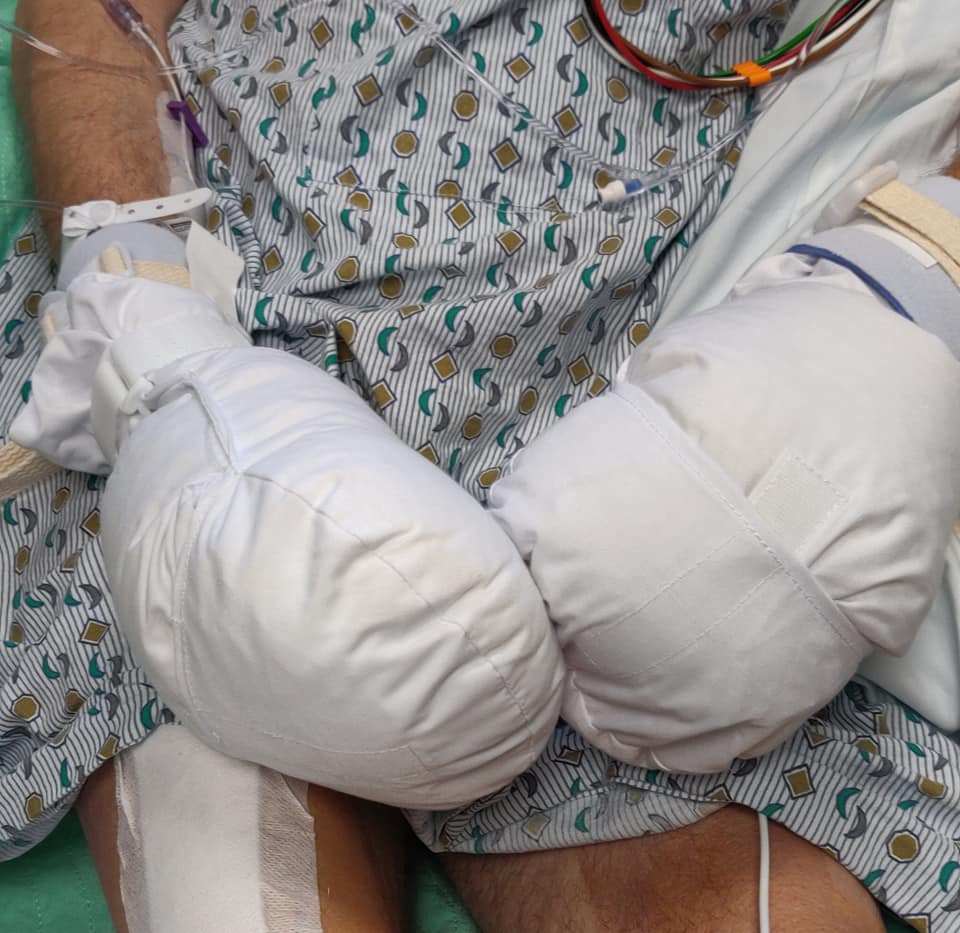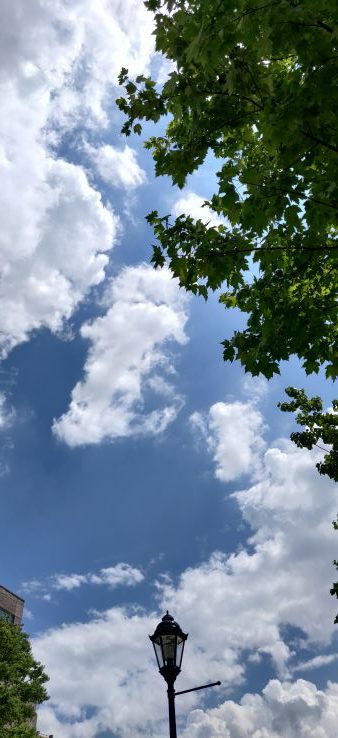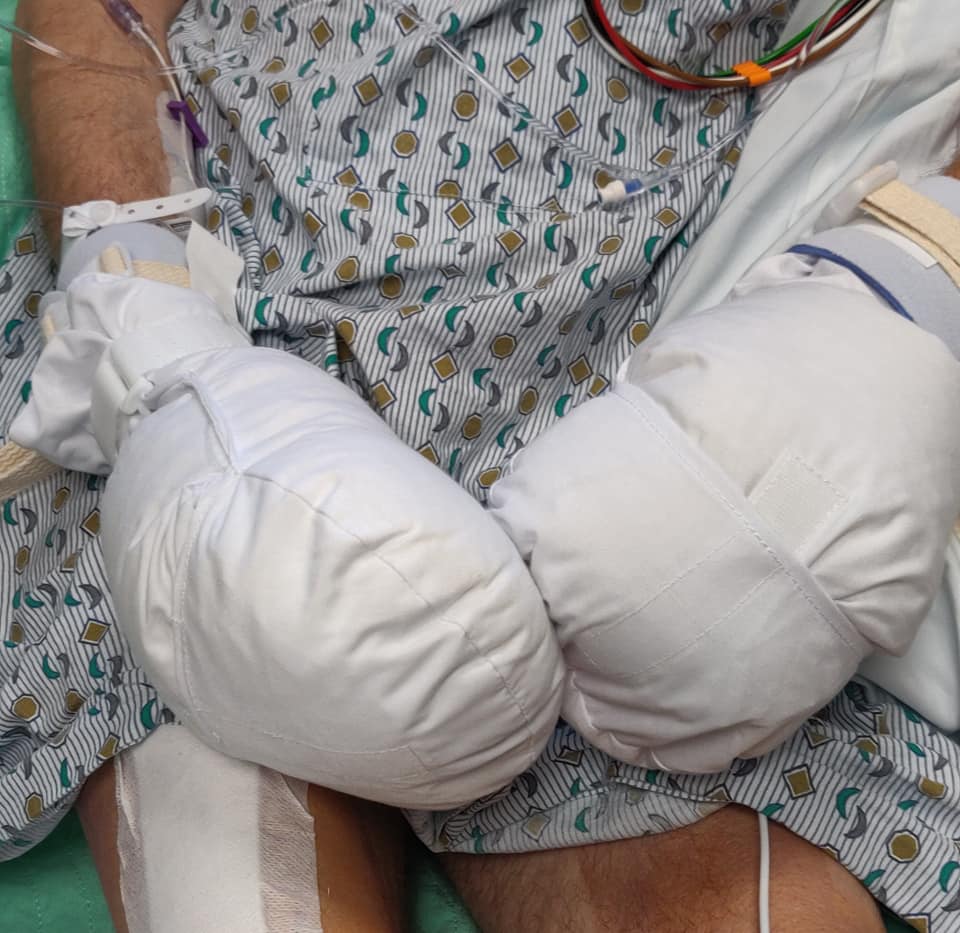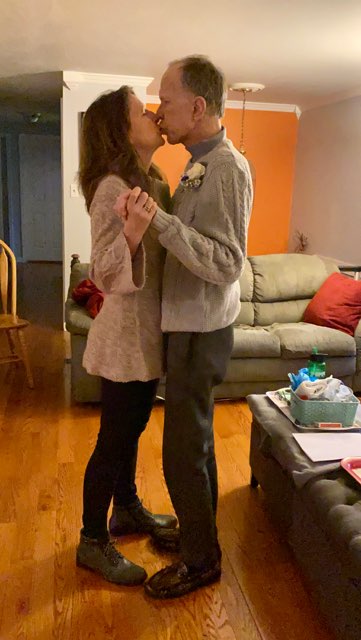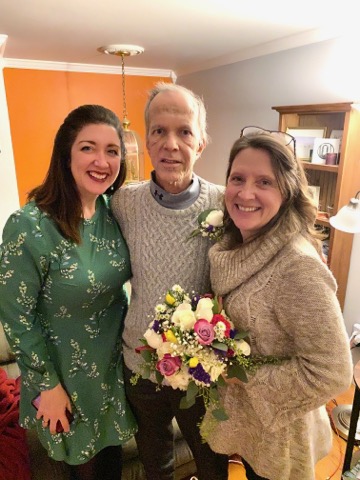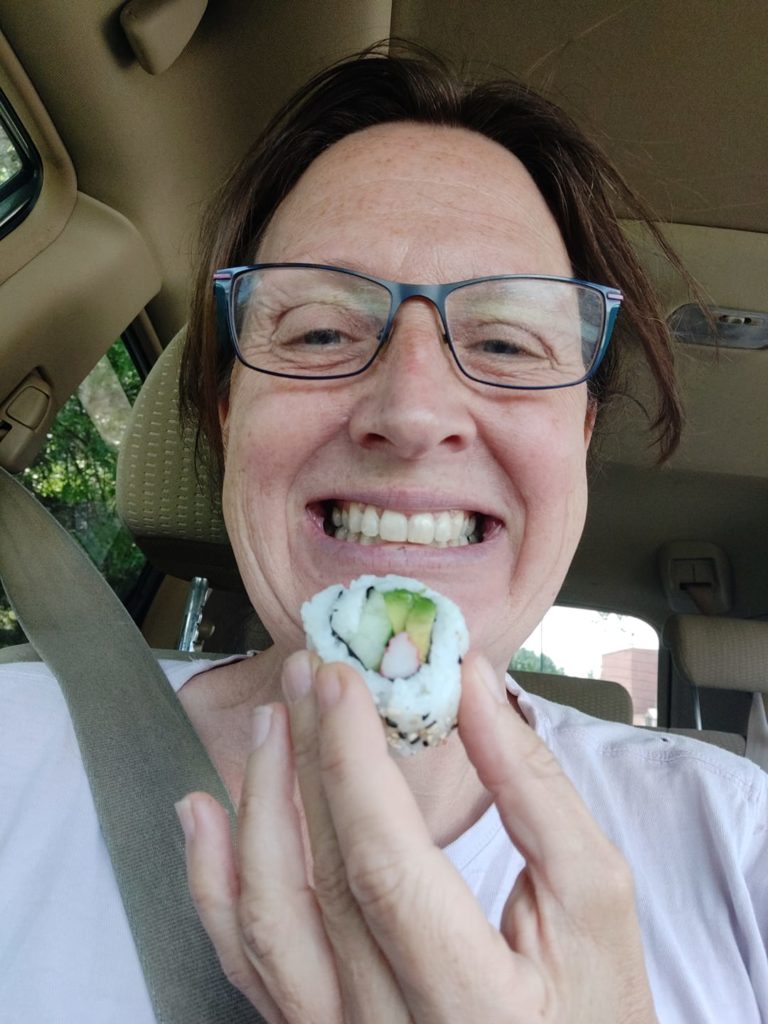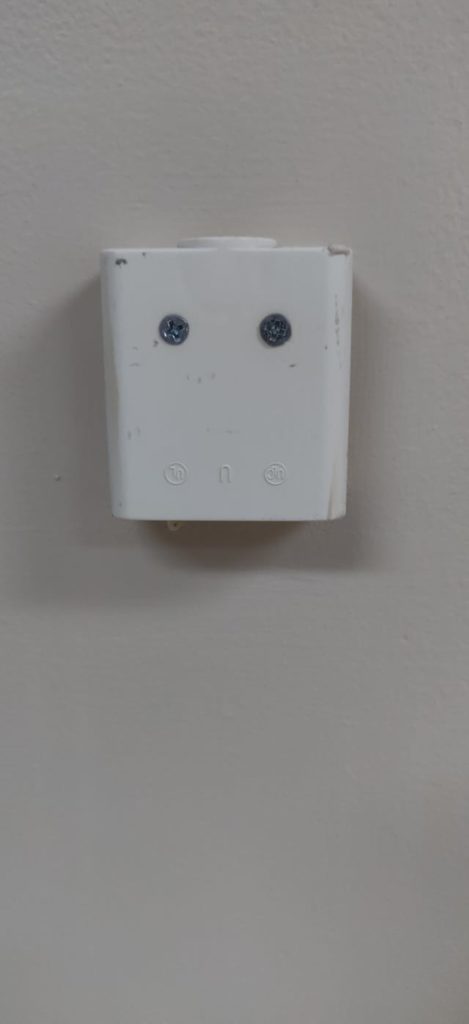Yesterday, I watched Mark eating his lunch and thought: He looks like a combination of Medusa and the Mayhem guy from the Allstate commercials. An hour later, he asked, “Do I look the same?” He probably feels like they laid him flat on his back in the OR, and then beat him with a stick. “You do,” I said. “Do you want to see a picture?” He nodded. He smiled as I took a picture. Then I showed it to him. “Looks mostly like me,” he said. It does. It’s Mark, and Medusa, and the Mayhem guy. He has approximately 55 staples holding his head together, 55 little silver steps climbing over the dome of his head from ear to ear. He has gauze covering most of this incision, except one piece got loose and is dangling over his right ear like a lock of white hair. His nose is stuff and stinted, with surgical string rip cords, as Alma’s boyfriend Adam referred to them, taped to the top of his nose. Instead of snakes like Medusa, he has tubing for three drains coming out of his head. Two come from the incision and are dangling down to his chest, where the drain bulbs are pinned to his gown. The third drain runs directly from his brain into a bag that slowly and continuously fills with cerebral spinal fluid. I watch it drip, drip, drip the colorless liquid all day long. He has a drain for his right thigh, where they took the tissue for the graft in the first surgery. He has a drain on his stomach, where they took belly fat in the second surgery to patch up the graft. He has compression socks humming as they fill over and over. He has wires attached all over for monitoring his vitals. His forehead has a pronounced pulse right in the center, where they removed and then reset the bone. His eyelids are a little swollen and are shiny from the ointment they put on several times a day.
So, mostly like himself.
A quick recap of what’s happening. Here’s the layering we have in our heads, outside-in: skin, muscle, bone, lining of the brain (dura), brain. Mark’s cancer messed with the dura and compromised it. The radiation then further messed with the dura, because any potential cancer cells had to be zapped there. So he had a lot of dead (hopefully all dead, since living tissue there could contain cancer cells) dura. There was also the lesion detected in recent MRI after he went to the ER for a spate of seizures. Lesions are dead cells. Dead dura is a potential site for infection. There was also the hole created by the cancer that was capped with a piece of plastic, the prosthetic. The plastic, too, was a potential site for infection. These are all the reasons for the surgery. Oh, and that he could not breathe through his nose at all, because of scarring from radiation. The surgery’s goal was clean out scar tissue so he could breathe again, remove the plastic piece, remove the dead dura, and replace the dead dura with live tissue from Mark.
We are in a waiting period to see how he heals. We are also waiting on pathology of the removed tissue.
At the earliest, the drains will be removed on Tuesday. The stints in his nose could be removed Monday or Tuesday. Then we watch and wait to see if the graft “takes.” On Tuesday, the graft failed in one spot. A nurse noticed Mark’s word retrieval had declined over a few hours, and that he was tired, and that he couldn’t hold up his right arm and leg as long as he could hold up the left side. A CT scan showed a pocket of air in the brain. Somehow, the spinal fluid drained and the air came in. They whisked him off to emergency surgery. The nurse who caught the problem hugged me as I sobbed. The anesthesiologist called me from the OR to get my consent, and he put the phone on speaker so that Mark could hear me say calming words before the surgery. I went back to the surgical waiting room to wait out the night. When they were finished, the ENT surgeon and neurosurgeon told me they had they taken some fat from his stomach to create another layer over the graft. They needed a good seal. It’s a tricky spot to work on, they said. It’s day to day.
The graft “taking” means that it needs to not have any gaps. It also means that the graft needs to vascularize, because what Mark needs is living tissue there keeping the brain safe and sound. We will know if it works only by clues that it’s not working. That could be confusion, lethargy, lack of symmetry in muscle coordination, uneven pupil dilation. He may be home while we watch for all this. It depends on how things go. The current plan is that he will move from the hospital to a rehab. He’s been in bed for six days, and it’s been enough that he is very unsteady on his feet. He needs to build up those walking skills again before he’s safe to come home.
Yesterday, Mark was ornery. When the nurse asked him if he could please hold up the wires and his gown so she could give him a heparin shot in his belly, he said, “I could, but I’m not going to.” Then he muttered, “Just kidding.” When he wanted to sit up higher in the bed, I told him we needed to wait for the nurse. He’s not allowed to reposition himself at all, because the height for the spinal fluid drain has to be specifically situated using a laser to the right location on his head. They are constantly monitoring his intracranial pressure, and they are very serious about it. If he breaks the rules and sits up, or leans over, his brain could hemorrhage. This is one of the reasons he’s restrained unless someone is in there watching him. When he’s ornery, he’s not impressed by this. “It’s not going to happen,” he says confidently. I explained it to him again, and again. He was quiet for a while. “What are you thinking about?” I said. “Your paranoia,” he said.
Yesterday before I left to go home, I told Mark to rest and listen to the doctors and nurses. “Eh,” he said, shrugging. “Mark, it’s important that you listen to them. They know how to take care of what’s going on inside of you,” I said calmly. “Sounds like I’d have to give up a lot of authority,” he said. “Yes,” I replied, “Can you do that?” “Eh,” he said, “I don’t know.”
Sigh.
Today, whatever shifts these moods around had shifted. The nurse asked if he could sit up in the chair for twenty minutes, because the doctors do not want him in bed all the time. “Sure,” he said pleasantly, “Why not?” Last night, he asked for the nurse to bring him a phone so that he could call me to tell me he loves me and to thank me for coming to visit all these days. I brought him his readers, the New York Times, and the first big tomato from the garden today. “Thank you thank you thank you,” he said. “It’s the little things that make a big difference.”
As I was leaving today, the nurse told me that this morning they had been trying to do something with Mark and he said it could wait until I arrived. “My wife is my personal nurse,” he said.
That. And then some.
“Be good,” he said as I left today. “You too, honey,” I replied, “I’ll see you tomorrow.”
